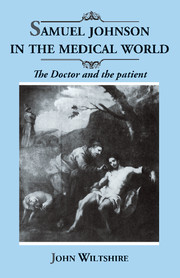Book contents
2 - The practice of physic
Published online by Cambridge University Press: 24 November 2009
Summary
AS WE have seen, Johnson's medical history has attracted a good deal of attention during the last 200 years, and doctors specialising in a multitude of different ailments have written on his case. Little, though, has been written about his medical interests and beliefs. Occasional articles in medical journals have reminded us of Johnson's life-long interest in medicine and have cited some of his experiments and views, but there has been no attempt to reconstruct the system of beliefs that lies behind Johnson's very frequent medical advice, and without this much of what he said and practised must remain unintelligible. This has been partly, no doubt, because until quite recently a medicine confident of its own onward progress has deemed superseded therapeutics and their rationales hardly worth remembering, and partly because, of all therapeutic practices those of the early and mid eighteenth century, that ‘chaotic mixture’ as the medical historian Erwin Ackerknecht calls it, of notions and procedures, has seemed most recalcitrant to investigation and perhaps least worth attempting to understand. But to see Johnson in the midst of that ‘chaos’, that confused mixture of traditional procedures, empirical remedies and gropings towards a new more ‘scientific’ orientation may enable one not only to illustrate a comparatively neglected area of his intellectual interests, but to throw light – more generally – on the nature and constraining conditions of medical thinking in that era. ‘Even the mind of Newton’, Johnson observed in a review, ‘gains ground gradually upon darkness.’
- Type
- Chapter
- Information
- Samuel Johnson in the Medical WorldThe Doctor and the Patient, pp. 64 - 89Publisher: Cambridge University PressPrint publication year: 1991

